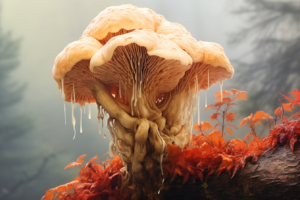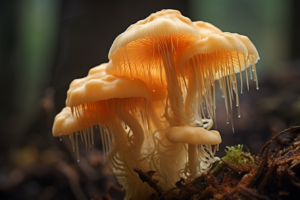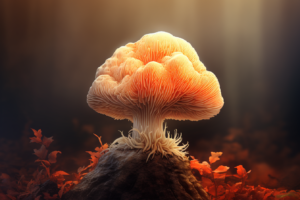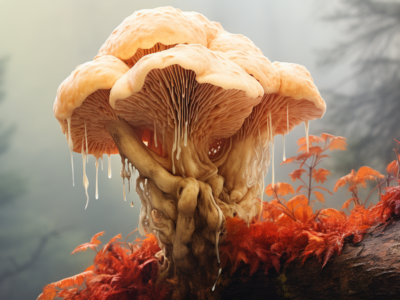Depression is a widespread mental disorder that affects millions of people worldwide. While there are various traditional treatments such as therapy and medication, researchers are continually searching for alternative methods to manage depression. Recent studies have suggested that lion’s mane mushroom may be an effective natural remedy for alleviating some symptoms associated with depression. In this article, we’ll delve into the therapeutic properties of lion’s mane and explore its potential use in treating depression.
What is Lion’s Mane Mushroom?
Lion’s Mane Mushroom, also known as Hericium erinaceus, is a type of edible mushroom native to Asia and North America. Its unique appearance resembles that of a lion’s mane, with long white spindles projecting from the center of the mushroom. In recent years, Lion’s Mane has gained attention for its potential health benefits and medicinal properties.
 Studies have shown that Lion’s Mane contains compounds called polysaccharides and beta-glucans, which may have anti-inflammatory effects in the body.
Studies have shown that Lion’s Mane contains compounds called polysaccharides and beta-glucans, which may have anti-inflammatory effects in the body.
Additionally, it is rich in antioxidants and can potentially boost cognitive function by promoting nerve growth factor (NGF) production in the brain.
As such, researchers are looking into its use for various purposes including immune system support and treating depression.
Overall, while more research needs to be conducted on Lion’s Mane Mushroom’s effectiveness in treating depression specifically – given promising results from preliminary studies – this could become an important new method for managing symptoms associated with this widespread mental disorder.
The Link Between Lion’s Mane and Depression
Depression is a complex mental health disorder that affects an individual’s emotional well-being and can have debilitating consequences. While traditional treatments for depression exist, research into alternative methods has shown promising results. In recent years, the lion’s mane mushroom has been increasingly studied for its potential therapeutic benefits in treating depression.
Studies have suggested that components found within the lion’s mane mushroom may promote the production of nerve growth factors (NGF) which are essential for brain function and development. NGF deficiencies have been linked to cognitive impairments and several neurological disorders such as Alzheimer’s disease and depression. Additionally, certain compounds found within lion’s mane may reduce inflammation in the body – a process deeply implicated in various mood disorders. Together these properties suggest its use as a natural remedy for managing symptoms associated with depression can be beneficial but more clinical trials are needed before any broad conclusions can be drawn around its efficacy or safety profile when used to treat this condition.
How Lion’s Mane Affects the Brain
The therapeutic benefits of lion’s mane mushroom extend beyond its culinary uses. Research shows that this mushroom contains compounds that have positive effects on brain function and mental health, including depression. Lion’s mane works by promoting the growth and regeneration of nerve cells in areas of the brain responsible for mood regulation.
One study found that consuming lion’s mane extract improved symptoms of anxiety and depression in mice. These results suggest that lion’s mane may be a natural alternative to traditional antidepressants. The mechanism behind these effects is thought to involve increased levels of key neurotransmitters such as serotonin and dopamine, which play a significant role in regulating mood.
Lion’s mane may also offer neuroprotective properties against age-related cognitive decline, dementia, and Alzheimer’s disease due to its ability to improve memory recall tasks at lower doses over time. Therefore, it stands as potential treatment options for patients suffering from various neurological disorders. However, more studies are needed to fully understand how lion’s Mane affects our cognition and overall neuro health before being recommended for clinical use broadly.
Lion’s Mane as a Natural Antidepressant
Lion’s mane, a medicinal mushroom with neuroprotective and anti-inflammatory properties, has shown promising results in studies as a natural antidepressant.

Lion’s Mane is believed to work by increasing levels of nerve growth factors (NGF) which protects the brain cells from damage caused by depression or anxiety.
Studies have reported contradictory effects; however, most studies show improvement in mood symptoms when people consume lion’s mane.
In comparison to traditional antidepressants, lion’s mane lacks side-effects like dizziness or nausea that can cause additional discomfort for patients suffering from depressive disorders.
As more research is conducted on its benefits and therapeutic effects, it could emerge as an effective adjunct medicine alongside standard therapies such as psychotherapy and medication for treating depression.
While further clinical trials are needed before embracing lions’ Mane as a mainstream remedy for depression beyond what science suggests but preliminary evidence demonstrates promise for their role in mental health treatment plans.
Lion’s Mane vs Traditional Antidepressants
Depression is often treated with traditional antidepressants, but these drugs can have unwanted side effects. Furthermore, not everyone responds well to pharmaceuticals. Lion’s mane mushroom is a natural alternative that may hold promise in managing depression symptoms without the adverse reactions commonly seen with prescription drugs. Research has shown that lion’s mane contains bioactive compounds, including polysaccharides and erinacines, which activate the nervous system and promote mental health benefits.
Studies have shown that lion’s mane supplements could improve cognitive function by increasing neurotrophic factors and promoting nerve growth within the brain regions linked to mood regulation. Additionally, some users report feeling an improvement in their mental clarity after taking the supplement regularly. Although further research is needed on how much dosage of lions’ mane extract should be consumed for optimal therapeutic effect on depression; however it seems like this natural remedy has great potential as a complementary treatment plan alongside other therapies available for individuals seeking help managing depressive symptoms. Caption: Lion’s Mane Natural Remedy May Help Relieve Symptoms of Depression
Precautions and Side Effects of Lion’s Mane
Before incorporating Lion’s Mane into your diet, it is essential to understand the potential side effects of this mushroom. Although Lion’s Mane is generally safe for consumption, some people may experience stomach discomfort and diarrhea when consuming large quantities. It is recommended that you start with a small dosage and gradually increase it over time to minimize any adverse reactions.
 Moreover, if you have any allergies or are taking certain medications such as blood thinners, be sure to consult with a healthcare professional before consuming Lion’s Mane. Additionally, pregnant women and individuals undergoing chemotherapy should avoid consuming Lion’s mane due to limited research on its effects on these groups.
Moreover, if you have any allergies or are taking certain medications such as blood thinners, be sure to consult with a healthcare professional before consuming Lion’s Mane. Additionally, pregnant women and individuals undergoing chemotherapy should avoid consuming Lion’s mane due to limited research on its effects on these groups.
In summary, while research indicates promising results in using lion’s mane mushrooms as an alternative treatment for depression symptoms, there are still precautions one must take before adding it to their routine. It’s critical always to practice proper dosages and seek medical advice if experiencing severe reactions or uncertainty around the use of this natural remedy.
Incorporating Lion’s Mane into Your Treatment Plan
Incorporating lion’s mane into your treatment plan may be a natural and effective way to manage depression. Lion’s mane mushroom contains various properties that have been shown to improve mood and cognitive function. Studies have suggested that it can increase the production of nerve growth factors (NGF) in the brain, which are known to protect neurons and promote their regeneration.
Additionally, lion’s mane has anti-inflammatory properties that can help reduce inflammation in the brain linked with depression. The mushroom is also believed to promote healthy gut bacteria, which research suggests play a role in regulating mood. Incorporating lion’s mane supplements into your daily routine or consuming it as part of your diet may prove beneficial for managing symptoms of depression as well as promoting overall mental wellness.
However, it is important to note that while animal studies have shown promising results for using lion’s mane as a natural remedy for depression, more human studies are needed before definitive claims on its effectiveness can be made. As with any treatment plan, it is recommended to consult with a healthcare professional before incorporating any new supplement or dietary changes into your routine when treating mental health issues like depression.
In Summary:
Lion’s Mane, a therapeutic fungus known for its mental health benefits, may provide a pathway to help improve symptoms of depression and anxiety. This medicinal mushroom works by stimulating nerve growth in the hippocampus, a region of the brain associated with emotional responses and memory, which can reduce anxiety and alleviate symptoms of mental health problems.
Taking Lion’s Mane mushrooms can help reduce chronic inflammation, often associated with mental illnesses. Key compounds in the fungus, such as interleukin and tumor necrosis factor, can modulate cytokine production, potentially offering relief from chronic depression symptoms.
Human research, while limited, suggests that Lion’s Mane could be beneficial in treating depressive disorders. Anecdotal evidence and preliminary studies show that taking Lion’s Mane mushroom supplements for 4 weeks could lead to a noticeable reduction in brain fog and an improvement in sleep quality.
However, it’s essential to understand that while these findings are promising, they do not necessarily correlate to a cure. The efficacy of Lion’s Mane in depression treatment is still under evaluation by the Food and Drug Administration (FDA), and while Lion’s Mane may not always work for everyone, those interested in taking Lion’s Mane should consider it as part of a holistic approach to managing depression.
Always consult with a healthcare provider before adding any new dietary supplements to your regimen. Information about Lion’s Mane and its potential effects on depression and anxiety is for informational purposes only and is not intended to diagnose, treat, cure, or prevent any disease.

Common Questions:
Q: Can Lion’s Mane help with depression?
A: There are several studies that suggest Lion’s Mane mushroom can indeed help alleviate symptoms of depression.
Q: How does Lion’s Mane help with depression?
A: Lion’s Mane contains a compound called hericenones and erinacines which have been shown to increase levels of dopamine, a neurotransmitter that helps regulate mood.
Q: Is Lion’s Mane a nutrient?
A: Yes, Lion’s Mane mushroom is a nutrient-rich food that contains various vitamins and minerals, such as copper, zinc, and vitamin B12.
Q: Can taking Lion’s Mane improve the way you feel?
A: Some people report feeling more energized and focused after taking Lion’s Mane supplements regularly. However, everyone’s body is different, and results may vary.
Q: Is Lion’s Mane a placebo?
A: No, Lion’s Mane is not a placebo. There have been clinical studies conducted on the effects of Lion’s Mane mushroom on mood and cognition, which have found positive results.
Q: Can Lion’s Mane alleviate symptoms of anxiety?
A: There is some evidence to suggest that Lion’s Mane may help to reduce symptoms of anxiety in some people.
Q: Can I take Lion’s Mane supplements if I’m already taking antidepressants?
A: If you’re interested in taking Lion’s Mane alongside antidepressants, it’s best to consult with a healthcare professional first to avoid any potential interactions.
Q: Is Lion’s Mane the only natural option for alleviating symptoms of depression?
A: No, there are several other natural remedies that may help alleviate symptoms of depression, such as St. John’s Wort and omega-3 fatty acids.
Q: Can Lion’s Mane be found in mycelium form?
A: Yes, Lion’s Mane can be found in mycelium form, which is the vegetative part of the mushroom before it produces a fruiting body.
Q: Is Lion’s Mane evaluated by the food and drug administration (FDA)?
A: Lion’s Mane and other natural remedies are not evaluated by the FDA, as they are not considered drugs. However, Lion’s Mane supplements are regulated by the FDA as dietary supplements.



 Lion’s Mane and Stress Management: Manage Stress Relief
Lion’s Mane and Stress Management: Manage Stress Relief
